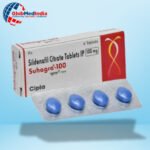🔍 Introduction
With the growing burden of type 2 diabetes mellitus (T2DM) globally and particularly in the United States, effective management has evolved beyond simple glucose-lowering strategies. Empagliflozin, a sodium-glucose cotransporter 2 (SGLT2) inhibitor, is now considered a revolutionary treatment not just for glycemic control but also for cardiovascular and renal protection.
In this article, we dive deep into how Empagliflozin is shaping modern diabetes care, backed by research from top US-based healthcare institutions, FDA data, and clinical trials.
💊 What Is Empagliflozin?
Empagliflozin is an oral prescription drug sold under the brand name Jardiance. It is FDA-approved to:
-
Lower blood sugar in adults with T2DM
-
Reduce the risk of cardiovascular death in adults with type 2 diabetes and heart disease
-
Treat heart failure with reduced ejection fraction (HFrEF)
⚙️ Mechanism of Action
Empagliflozin works by:
- Inhibiting SGLT2 in the proximal renal tubules
- Preventing glucose reabsorption in kidneys
- Promoting urinary glucose excretion
- Lowering plasma glucose levels independent of insulin
This novel approach sets it apart from traditional antidiabetic drugs like Metformin and Sulfonylureas.
📈 Clinical Benefits
✅ Key Outcomes from Clinical Trials:
-
Reduces HbA1c by 0.5–1.0%
-
Supports weight loss (2–3 kg)
-
Lowers systolic blood pressure
-
Reduces risk of hospitalization for heart failure
-
Slows progression of kidney disease
❤️ Cardiovascular and Renal Protection
Empagliflozin is the first SGLT2 inhibitor shown to significantly reduce cardiovascular mortality in patients with T2DM and established heart disease.
-
38% reduction in cardiovascular death
-
35% lower hospitalization for heart failure
-
Proven renal benefits, including albuminuria reduction
🧑⚕️ Who Should Use Empagliflozin?
Ideal candidates include adults with:
-
Type 2 Diabetes with or without cardiovascular disease
-
Diabetic nephropathy or chronic kidney disease
-
Heart failure with reduced ejection fraction (HFrEF)
Always consult a board-certified endocrinologist or cardiologist.
⚠️ Side Effects and Precautions
Common Side Effects:
-
Increased urination
-
Genital yeast infections
-
Urinary tract infections
-
Thirst and dehydration
Rare but Serious:
-
Ketoacidosis (DKA)
-
Fournier’s gangrene
-
Acute kidney injury
Patients should stay hydrated and monitor renal function regularly.
🔄 Comparison with Other Diabetes Drugs
| Drug | HbA1c ↓ | Weight ↓ | Cardio Protection | Renal Protection |
|---|---|---|---|---|
| Metformin | ✓✓✓ | Neutral | ✗ | ✗ |
| Empagliflozin | ✓✓ | ✓✓ | ✓✓✓ | ✓✓✓ |
| GLP-1 Agonists | ✓✓✓ | ✓✓✓ | ✓✓✓ | ✓✓ |
| Sulfonylureas | ✓✓✓ | Weight gain | ✗ | ✗ |
📊 Empagliflozin in Heart Failure
Empagliflozin is now approved for non-diabetic patients with heart failure (HFrEF), proving its versatility beyond glucose control.
🧬 Research & Real-World Studies
-
EMPA-KIDNEY Trial confirms delayed kidney failure
-
DECLARE-TIMI 58 Trial compared multiple SGLT2 drugs including Empagliflozin
-
REWIND Study for long-term cardiac impact
🛒 Where to Buy in the USA
👥 User Reviews
-
⭐ “Improved my A1C and I lost 7 lbs!”
-
⭐ “No more hospitalizations for heart failure!”
-
⭐ “My nephrologist now recommends it to everyone.”
🔗 Authoritative External Links
✅ Conclusion
Empagliflozin is more than just another diabetes drug — it’s a modern therapy with multisystem benefits. Its ability to address not only blood sugar but also heart and kidney health makes it a pillar of contemporary diabetes treatment.
If you’re managing type 2 diabetes, talk to your doctor to see if Empagliflozin (Jardiance) is right for your health goals.



